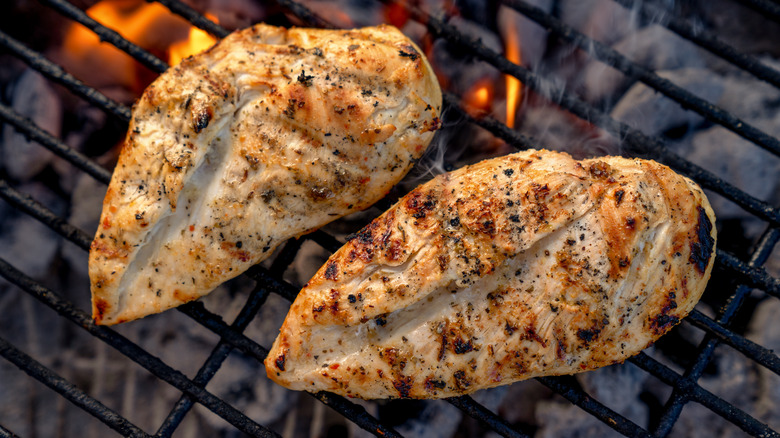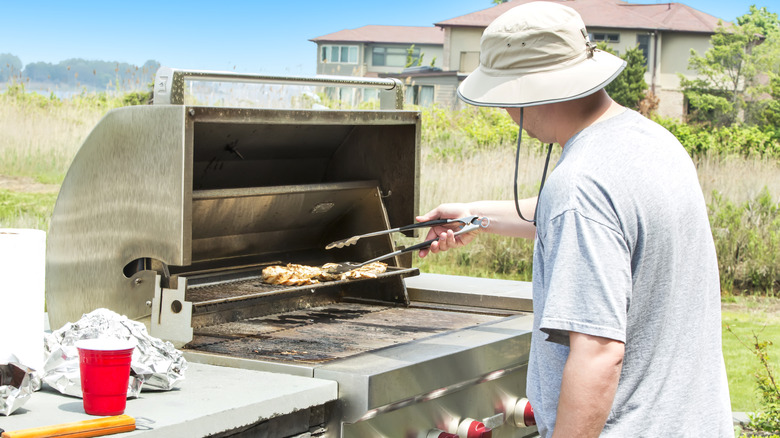Ina Garten Has A Clear Favorite In The Charcoal Vs Gas Grill Debate
Multi-hyphenate food world doyenne Ina Garten has plenty of tips that can improve your cooking game, but her expertise extends beyond the home kitchen. She's also knowledgeable when it comes to outdoor grilling, and has developed a range of grilled dishes featuring main courses, sides, and even tempting breakfast hot dogs. According to the Barefoot Contessa website, the popular cookbook author has a specific preference when it comes to grill type. When asked if she'd rather cook with a charcoal or a gas grill, Garten replied, "I prefer a charcoal grill because I like the flavor."
The TV show host and cookbook author went on to say that it's "perfectly fine" to prefer the convenience of turning on a gas grill, as these appliances require a lot less effort overall (especially when you employ some helpful gas grill hacks). It's definitely true that each grill type offers its own benefits and drawbacks, as illustrated by Garten's preference for the unique flavor created by charcoal grills. Understanding these differences will help you choose the best appliance with all the confidence exhibited by the Barefoot Contessa herself.
There's no beating the flavor of charcoal grilling
There's a very good reason why charcoal grills and seared meat are a match made in culinary heaven. This type of grilling is capable of reaching extremely high temperatures (up to 1,600 degrees Fahrenheit in some cases) and exposure to intense heat is what creates that perfect charred crust on grilled meats. High temperatures also give charcoal grilled foods their characteristic smokiness, which gas grills can't rival. As food cooks over charcoal, it drips fat and/or moisture onto the hot coals, creating ample amounts of smoke. As this smoke drifts upward, it imbues everything it touches with that earthy charcoal flavor.
This process is precisely why Ina Garten would rather cook her carefully planned meals on a charcoal grill. However, grilling over charcoal does carry some downsides. Along with easier maintenance and cleaning, gas grills aren't linked to the same health concerns as charcoal versions. According to Healthline, the high temperatures essential for a smoky flavor increase carcinogen exposure. Additionally, the large volume of smoke created by charcoal grills also contains a high number of carcinogens. Based on these factors, frequent grilling is thought to increase a person's risk of cancer.
Gas grills are better for you (and the environment)
The fact that gas grills can't reach the same temperatures as charcoal is a benefit and a drawback. While these devices aren't linked to the same health concerns, they aren't able to fully replicate the delectable flavor profile associated with charcoal grills. That's why it's important to keep the cover of your gas grill closed when cooking, since a covered device will be better able to maintain a consistent temperature. This way, you can use a smoker box with your gas grill but remember that the flavor won't be exactly the same.
One of the biggest benefits offered by gas grills is their ease of use. Because they take less time (and effort) to heat up and cool down, you're likely to get a lot more use out of the device. Also, proponents of gas grills can feel good knowing that these appliances are much better for the environment. As charcoal burns, it releases more toxins into the air than gas. Propane grills are particularly environmentally friendly, as this fuel is considered a lot more efficient than other types of gas. Despite the positive aspects of gas, Ina Garten's preference for charcoal grills is an opinion shared by many people. And like many other areas of life, grill masters must weigh the pros and cons of each option to make the best decision.


